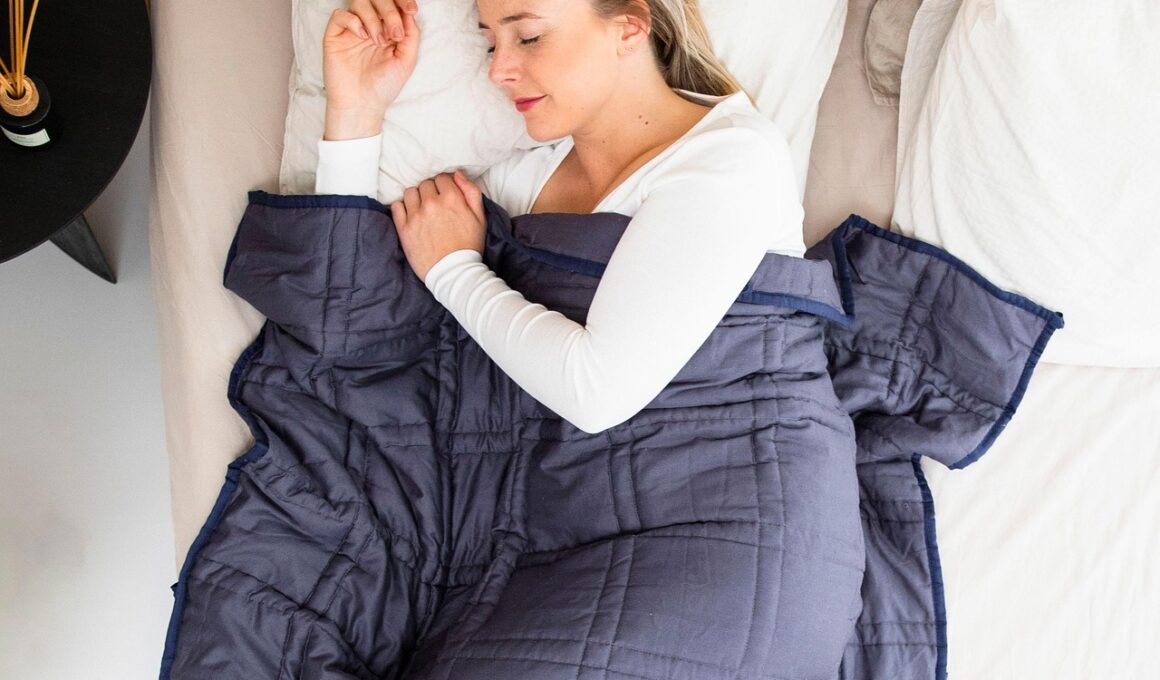Weighted Blankets and Sleep Quality: Do They Help Fitness Recovery?
Understanding the factors affecting sleep quality is crucial for anyone serious about fitness recovery. Proper sleep allows muscles to repair and grow, and inadequate rest can hinder this process. One potential solution gaining attention is the weighted blanket. These blankets exert gentle pressure on the body, a technique known as deep touch pressure (DPT). Proponents of weighted blankets argue that these can help reduce anxiety or stress, leading to improved sleep quality. Poor sleep quality is often linked with increased cortisol levels, which can stall recovery and muscle growth. As such, using a weighted blanket may assist in optimizing sleep quality and thus enhance recovery. There is a variety of weighted blankets available, ranging from various weights to different materials. Choosing the appropriate type can mean the difference between a restful night and a restless one. Furthermore, the application of a weighted blanket may help individuals fall asleep faster and stay asleep longer. However, it’s important to note that weighted blankets might not suit everyone. Individual preferences and physical comfort must be considered when trying out one of these blankets.
How Weighted Blankets Function
Many individuals often inquire about how weighted blankets work when considering them for improved sleep. Fundamentally, these blankets are filled with materials like glass beads or plastic pellets, which provide a weighted feel. This design promotes a calming effect by mimicking the sensation of being held or hugged, thus enhancing relaxation. The physical pressure these blankets exert may stimulate serotonin and melatonin production, both crucial in regulating mood and sleep. Studies show that increased serotonin levels promote a sense of well-being, while melatonin is known as the sleep hormone. Therefore, individuals using weighted blankets might find it easier to relax, which can lead to falling asleep faster. It’s also suggested that using a weighted blanket could reduce levels of anxiety that interfere with sleep. For athletes or fitness enthusiasts, reducing anxiety can be vital for recovery. Moreover, weighted blankets may benefit those dealing with insomnia, restless leg syndrome, or other sleep disturbances. Ultimately, the science behind weighted blankets supports their potential benefits for sleep quality and fitness recovery, making them an increasingly popular choice for enhancing the overall rest experience.
One essential consideration when exploring the benefits of weighted blankets relates to their impact on various sleep disorders. Numerous studies suggest they may be beneficial for individuals who struggle with anxiety or conditions like Attention Deficit Hyperactivity Disorder (ADHD). This aspect is critical for fitness recovery in athletes, as high strain can often lead to heightened anxiety and disturb restful sleep. People who frequently experience anxiety may find it challenging to unwind and prepare for sleep, which subsequently affects muscle recovery. The deep pressure caused by a weighted blanket can help calm the nervous system, making it easier to slip into a tranquil state. As a solution, it’s important to assess individual needs when selecting a weighted blanket. Considerations should include personal weight, preferences regarding materials, and specific health conditions. While many individuals report positive experiences with these blankets, it’s essential to remember that comfort is subjective. Testing different weights and sizes can provide insight into what works best for your personal sleep environment. By alleviating anxiety, weighted blankets could inherently lead to a more restful night, thereby promoting recuperation for active individuals engaged in intense training.
In the quest for enhancing sleep quality, some common concerns arise regarding the usage of weighted blankets. One prevalent worry involves overheating during the night, especially since many individuals tend to sleep hot. Some weighted blankets are made with breathable materials to alleviate this concern, allowing air circulation while maintaining comfort. Choosing a blanket with a removable cover that can be washed is another critical feature that can improve hygiene and longevity. Additionally, individuals should seek a blanket weighing about 10% of their body weight to achieve the best results from using a weighted blanket. However, trying different weights may be necessary to find the perfect fit. The impact on sleep patterns can vary significantly from one person to another, indicating that personal experience is paramount. Furthermore, mindful consideration of individual sleep positions is also essential. Side sleepers may require different blanket designs compared to back or stomach sleepers to ensure complete comfort and effectiveness in promoting rest. Enthusiasts often report increased feelings of safety or comfort, contributing to a restorative sleep experience for fitness recovery. Monitoring changes post-usage can bring insights into the overall impact on recovery.
Potential Downsides of Weighted Blankets
While the benefits of weighted blankets are widely discussed, it is equally important to consider potential downsides or drawbacks. For some, initial usage may lead to discomfort, particularly individuals who are not accustomed to the restrictive feeling. If a blanket is too heavy or poorly fitted, it could hinder sleep instead of promoting it. Those with certain medical conditions, such as respiratory issues or claustrophobia, might also find weighted blankets unsuitable. Safety must always come first. It is advisable to consult with a healthcare provider before integrating one into your sleep routine, especially for those having prior medical evaluations or complications. Additionally, another concern pertains to cost; weighted blankets can vary significantly in price, depending on the materials used. When investing in sleep products, finding a balance between quality and affordability is crucial. Furthermore, frequent washing and maintaining the blanket can be time-consuming for some. As lightweight alternatives become increasingly available, users should research thoroughly to identify options that cater to their needs. Ultimately, understanding the potential downsides can empower individuals to make informed choices about whether a weighted blanket is the right fit for enhancing their sleep quality.
As more individuals integrate weighted blankets into their routines, they often express the need for tips on optimizing their usage. One effective way is to establish a consistent bedtime routine while incorporating the blanket. For instance, use the blanket in conjunction with a guided meditation session or gentle stretching exercises to promote relaxation before sleep. This could help signal your body that it’s time to wind down, making sleep more attainable. Additionally, individuals should create a conducive sleep environment by reducing light and noise levels. Calming scents, such as lavender, can also enhance relaxation when combined with a weighted blanket’s soothing weight. It’s also beneficial to isolate the blanket for use solely during sleep times, to reinforce the mental association between the blanket and a restful night. Regular feedback on how the blanket impacts sleep can be valuable for finding the optimal weight and methods of usage. As the recovery process is inherently personal, understanding your body and how it interacts with different sleep aids will yield the best results. Ultimately, being mindful of these tips will assist in maximizing the benefits a weighted blanket can offer for improved recovery in fitness routines.
Final Thoughts on Sleep and Recovery
In conclusion, sleep quality plays a profound role in fitness recovery, as the body needs ample rest for muscle rebuilding. Weighted blankets emerge as a promising option for improving sleep quality, particularly for those facing anxiety or sleep disturbances. While research confirms their potential benefits, personal preference and comfort cannot be overlooked. It’s essential to experiment with various weights and designs, tailoring the choice to individual needs and experiences. Monitoring each usage’s impact on sleep and recovery can provide significant insights over time. If the concept aligns with personal objectives, adopting a weighted blanket can enhance the nightly routine and promote a restful sleep environment. Ultimately, individuals should prioritize sleep as a critical factor in recovery, as enhanced recovery leads to better overall performance in fitness endeavors. Thus, employing tools like weighted blankets could turn out to be beneficial for athletes seeking effective ways to upgrade their sleep quality. This assists in not only achieving better recovery but also facilitates overall well-being. Embracing better sleep practices ultimately supports long-term fitness success, making the exploration of weighted blankets worthwhile for sustained results.
Despite the many initial considerations when adopting a weighted blanket, many enthusiasts share success stories of improved sleep quality. With proper research, adjusting to the weight of the blanket, and establishing a consistent bedtime routine, individuals can find a usable solution for enhancing rest. Embracing innovative sleep aids can ultimately lead to better recovery in fitness routines by promoting deeper, more restorative sleep.


